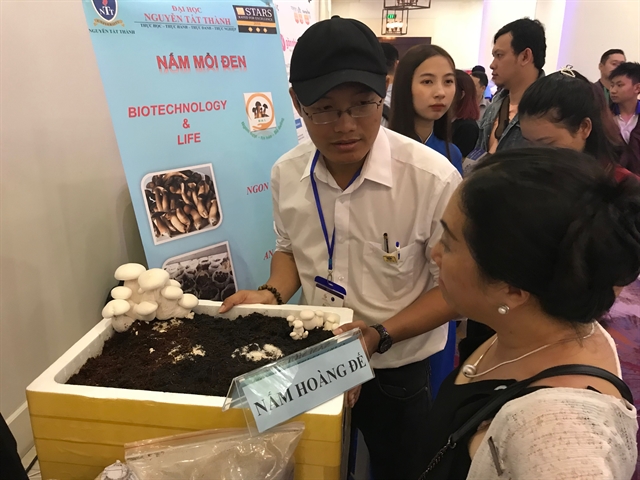 Society
Society

Many start-ups have brought their technologies and products into the market in 2017-19 thanks to financial and technical assistance for R&D provided by the HCM City Department of Science and Technology’s SpeedUp innovation and start-up programme.

|
| Start-ups exhibit their products and solutions at the recent HCM City Innovation, Startup and Entrepreneurship Week. The city’s innovation programme, SpeedUp, has funded 50 start-ups since 2017. — VNS Photo Gia Lộc |
Gia Lộc
HCM CITY — Many start-ups have brought their technologies and products into the market in 2017-19 thanks to financial and technical assistance for R&D provided by the HCM City Department of Science and Technology’s SpeedUp innovation and start-up programme.
Nguyễn Hồng Bắc and a partner started a business three years ago to turn vegetables into instant powder from which beverages can be made. The vegetables include fish mint, perilla frutescens and pennywort.
They were among the start-ups to benefit from the SpeedUp.
The programme has helped them develop more new products using technology such as pennywort powder mixed with rock sugar, Bắc said.
“If there was no assistance from the programme, our new products will not be in the market in this year. These products will help add value to Vietnamese vegetables and address the problem of how to process vegetables after harvesting.”
Vegetables harvested in the morning rot by afternoon if not sold, he said.
His start-up was chosen for assistance under the programme through a centre for incubating high-technology agricultural businesses.
Nguyễn Hải An, the centre’s director, said instant pennywort powder is very popular among overseas Vietnamese and foreigners.
Bắc added that these products are sold in markets like South Korea, India and the US.
An said through the centre, many other high-tech agriculture start-ups have received assistance under the programme in 2017-19.
Many of them have been doing well.
A company that uses innovative technologies to produce and can dried fresh noodles, for instance, reported a turnover of VNĐ800 million (US$34,560) in 2017, VNĐ1.3 billion ($56,200) last year and VNĐ1.8 billion in just the first nine months of this year.
Another, which makes machines for drying wormwood, a medical herb, and incense made from it, earned a profit of VNĐ150 million last year and VNĐ250 million in the first nine months of this year.
Phan Thị Quý Trúc, a specialist in technology and markets at the Department of Science and Technology, said 50 start-ups have received assistance under the programme, including 36 in fields like finance, business, tourism, education and others, and nine in agriculture.
As of last month, 21 of the 50 have become enterprises, she said.
One was bought by an investor while six others attracted investment based on their potential, she said.
In all, they attract investments of $538,000, she added.
But Phạm Ngọc Huy, director of Vietnam Silicon Valley, a start-up accelerator, said the programme has some shortcomings which need to be fixed.
The department is focusing too much on technologies and not enough on commercial elements such as business models and markets, he said.
Start-ups’ success also require good technologies for management and strategising, and while many young people have created start-ups, their technologies are limited, he said.
Moreover, it takes too long for the programme to disburse funds, and this affects start-ups, he said.
He suggested that the programme should invest directly in projects accelerators for investment. — VNS




